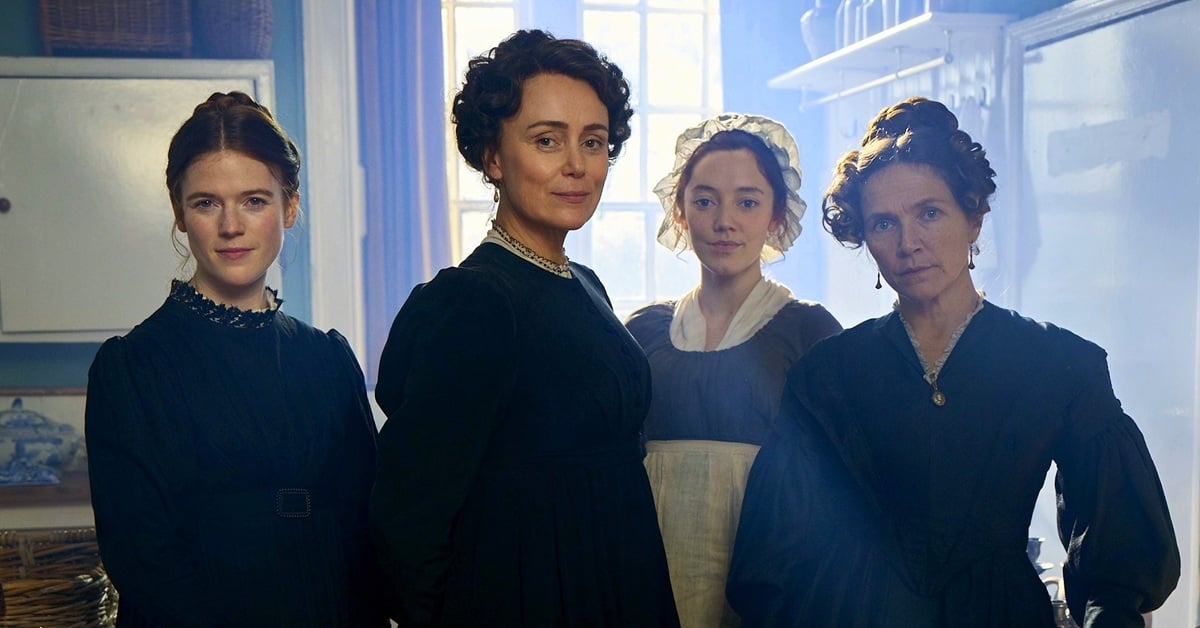Premiering Sunday, May 4, on PBS, Masterpiece: Miss Austen, adapted from Gill Hornby’s bestselling novel, offers a fictionalized explanation as to why Cassandra Austen destroyed so many of her famous sister Jane’s letters.
The result of Cassandra’s actions is that Jane Austen’s fans have huge gaps in their knowledge of the author’s inner life — and that really bothers a lot of people. Readers and scholars may want to know more about a writer’s thoughts and feelings, but how much do we really need to know?
I’ll get to that in a bit, but first …
What Happens in Miss Austen?
From PBS:
The drama begins in 1830, a while after Jane has died. Cassandra (Keeley Hawes) races to see her young friend Isabella (Rose Leslie) who is about to lose her home following her father’s death.
Cassandra is ostensibly there to help her friend, but her real motive is to find a stash of private letters which, in the wrong hands, could destroy Jane’s reputation. On discovering them, Cassandra is overwhelmed as she is transported back to her youth. In
flashback, we meet Young Cassy and Jane (Patsy Ferran) as they navigate the infatuations, family feuds and dashed hopes which shaped their lives and laid the foundations for Jane’s unforgettable stories. Cassandra’s re-evaluation of her past eventually leads her to realise how blind she has been to the real cause of Isabella’s heartache and distress.
Finding a way to guide Isabella towards true happiness, Cassandra is finally able to understand and celebrate the sacrifices she chose to make for her brilliant sister, Jane.
Is It Worth Watching?
Yes, indeed, if you’re an Austen fan or just love a good period romantic drama.
The story blends some facts about the Austen sisters with fictional characters and events. Ultimately, it creates a very Austen-esque love story, which, while predictable, is nevertheless satisfying (I was yelling at the screen, “Kiss her, already!”)
But, if you’ve read or watched adaptations of Jane Austen’s six full novels (some better than others) you know that they usually end in a wedding — or more than one.
I found Miss Austen to be engaging and entertaining, and not as self-consciously twee as some other Austen homages.
There is some diverse casting in one of the main roles, and I’m still not sure whether it was just color-blind casting or intended to mean something. I prefer when productions are clear on this point, but, it didn’t interfere with my enjoyment.
And for Downton Abbey fans, they get to see Scottish actress Phyllis Logan (a k a Mrs. Hughes) back in period dress, as the Austen sisters’ mother.
One thing that is very true in Miss Austen is that Cassandra was once engaged, but the engagement ended tragically.
Cassandra ultimately never married nor was separated from her sister until Jane’s premature death at 41, from … well, no one knows exactly. Speculation ranges from Addison’s disease to lymphoma to, most recently, lupus.
Miss Austen is also perfectly family-friendly, although pre-teens and younger probably won’t be especially interested.
About Those Letters
It’s known that Jane was a prolific correspondent with friends and family, but only 160 of her letters survive.
It’s long been speculated that Cassandra destroyed the bulk of Jane’s letters because there was something in them that might have damaged the writer’s reputation — or perhaps family relationships.
Jane likely turned her keen perception and sharp wit on those closest to her — at least that’s what Miss Austen speculates — so the preservation of family harmony may have been as much of a motivation as literary legacy.
Ultimately, we know little beyond the bare biographical facts about Austen’s life. Instead, she speaks to us primarily through her work.
Which Brings Me Back to the Question of …
… how much does one need to know about a writer’s life?
I just finished the audio version of Peter Ackroyd’s 2005 book Shakespeare: The Biography. The Elizabethan/Jacobean dramatist is often cited as the preeminent writer in the English language, with Regency-era Austen close behind.
They both left enduring, beloved works to posterity, but precious little of themselves.
Much of Ackroyd’s detailed, 592-page tome concerned itself with attempting to tease out clues about Shakespeare’s religious beliefs (He was utterly surrounded by Catholics, but did he practice the Faith? Some say yes; others aren’t so sure.), personality, political leanings and artistic inspirations.
A whole movie, the Academy Award-winning Shakespeare in Love, spins up a fanciful account of how the author came to write Romeo and Juliet.
The 2007 film Becoming Jane gives Austen a similar treatment.
In today’s celebrity culture, we are used to knowing far too much about creative people, be they actors, writers, musicians or whatever. A debate constantly rages about whether someone’s belief system or lifestyle negates the person’s creative work.
This is especially true of writers, since many non-writers seem to assume that everything in a fiction story (as opposed to a memoir or autobiography) can’t just be a product of imagination but must be based on something that actually happened to the author.
So, Is it True?
I have written fiction and screenplays, and I would say that, it could be true in some instances but usually … probably not.
For example, when I was in high school, I wrote a story about an orphan boy living with his brother and the brother’s girlfriend in an inner-city apartment. The boy secretly adopts a stray kitten, which meets an unfortunate fate due to the cat-hating girlfriend.
The story won a contest, and I had a brief flicker of fame because of it. I also became an object of concern for school officials, who worried whether this rather bleak tale was a product of my home life.
It was not.
I was not a boy, nor an orphan, nor did I live in a city or even an apartment, and none of my brothers had a girlfriend at the time. And I’ve never had a cat, alive or otherwise. I made it all up.
It was, as most stories are, bits of personal experience mixed with observation, extrapolation and pure imagination. But, you might ask, why did the cat have to die? Honestly, I thought it was an impactful way to end the story.
As I often say — and I joke this should be my epitaph — it seemed like a good idea at the time.
Wouldn’t be surprised if, to the consternation of English teachers and literary scholars everywhere, that is a plausible explanation behind a good percentage of what’s in fiction.
In Conclusion
Miss Austen is delightful, but it’s no more the truth of Jane Austen’s life than Becoming Jane. It also has elements of Cassandra’s biography, but even she is a mostly fictional creation.
Like Shakespeare before her, Jane Austen lives for us through her writing — and I think that’s just the way she would have wanted it.
Image: (L-R) Rose Leslie as Isabella, Keeley Hawes as Cassandra Austen, Mirren Mack as Dinah, and Jessica Hynes as Mary Austen. (C) Robert Viglasky Photography
Don’t miss a thing: Subscribe to all that I write at Authory.com/KateOHare.














